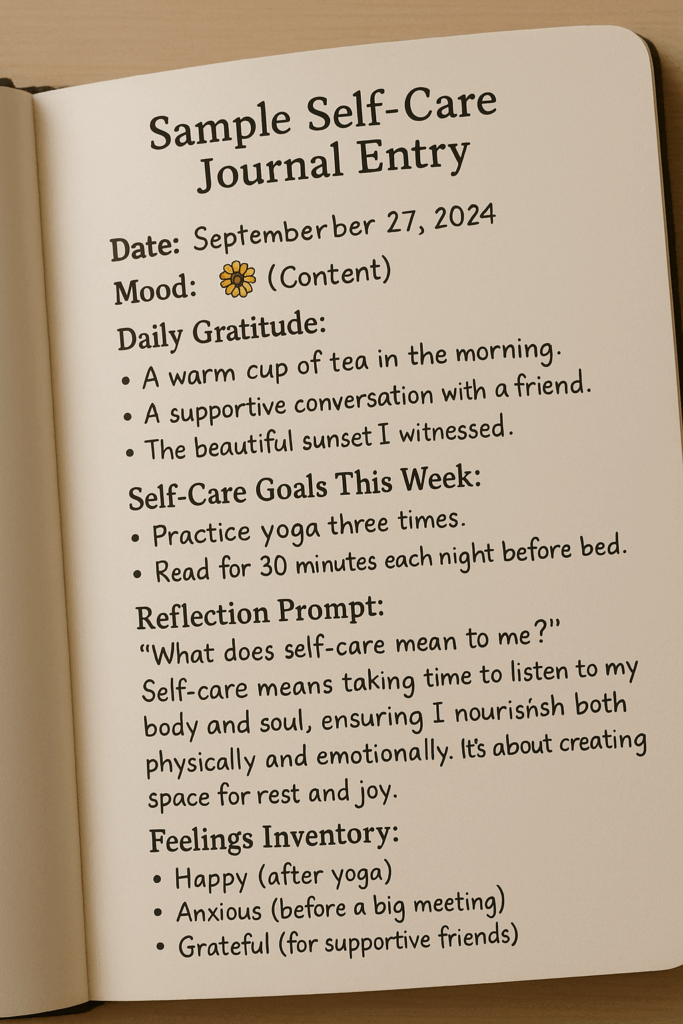In today’s fast-paced world, prioritizing self-care is essential for maintaining mental and emotional well-being. A self-care journal serves as a dedicated space for reflection, planning, and growth, helping you recharge and cultivate a more balanced life. This guide will explore what to include in a self-care journal, offer journaling exercises to help you recharge emotionally, and discuss how to use self-care journals for mental health.

What to Include in a Self-Care Journal
Creating a self-care journal allows you to focus on your personal needs and aspirations. Here are some essential components to consider including in your self-care journal:
1. Daily Check-Ins
- Mood Tracking: Start each entry with a simple mood tracker to assess how you’re feeling that day. Use emojis, colors, or words to quickly gauge your emotional state.
- Gratitude Lists: Dedicate a section for daily gratitude, where you list three things you’re grateful for. This practice helps shift your focus to positive aspects of your life.
2. Self-Care Goals
- Weekly or Monthly Goals: Outline specific self-care goals, such as practicing mindfulness, exercising, or dedicating time for hobbies. Having clear objectives can motivate you to prioritize your well-being.
- Progress Tracking: Include a section to track your progress on these goals, noting any challenges you faced and celebrating your successes.
3. Self-Reflection Prompts
- Journaling Prompts: Incorporate prompts that encourage deeper reflection on your feelings, needs, and desires. Examples include “What brings me joy?” or “What do I need to let go of to feel lighter?”
- Affirmations: Write positive affirmations that resonate with you. Revisit these regularly to reinforce a positive mindset and self-acceptance.
Journaling Exercises to Recharge Emotionally
Incorporating specific journaling exercises into your self-care routine can help you recharge emotionally and gain clarity on your thoughts and feelings. Here are some effective exercises to try:

1. Mindful Writing
- Set a timer for 10-15 minutes and write continuously without worrying about grammar or structure. Let your thoughts flow freely; this exercise helps release pent-up emotions and enhances mindfulness.
2. Feelings Inventory
- Create a feelings inventory list. Write down all the emotions you’ve felt throughout the week and explore the events or situations that triggered them. This exercise promotes self-awareness and understanding of emotional patterns.
3. Vision Board Creation
- Dedicate a page or two in your journal to create a vision board. Cut out images, quotes, and words that inspire you and represent your goals and desires. Visualizing your aspirations can motivate you to take steps toward achieving them.
4. Self-Care Activities List
- Write down a list of activities that rejuvenate you—whether it’s taking a bubble bath, going for a walk, or reading a book. Refer to this list when you need a quick pick-me-up or want to prioritize self-care.
How to Use Self-Care Journals for Mental Health
A self-care journal can be a valuable tool for supporting your mental health. Here’s how to effectively utilize it for this purpose:
1. Regular Reflection
- Make it a habit to reflect on your mental state regularly. Write about challenges, feelings, and coping mechanisms. This practice can provide insights into what works for you and what doesn’t, helping you develop healthier coping strategies.

2. Create a Self-Care Routine
- Use your journal to design a personalized self-care routine that suits your lifestyle. Outline specific activities for different days of the week or times of day, ensuring you’re consistently engaging in self-care practices.
3. Addressing Stress and Anxiety
- When you feel stressed or anxious, use your journal to articulate your thoughts and feelings. Writing can help process emotions and provide relief, serving as an outlet for frustrations and worries.
4. Celebrate Progress
- Periodically revisit your entries to see how far you’ve come. Celebrate milestones and achievements, no matter how small. Recognizing progress boosts self-esteem and reinforces the value of self-care.

A self-care journal is an essential tool for prioritizing your well-being in a busy world. By including daily check-ins, setting self-care goals, and engaging in reflective exercises, you can create a personalized space that encourages emotional recharge and mental clarity. Remember, self-care is not a luxury—it’s a necessity for living a balanced, fulfilling life. Embrace your self-care journey and celebrate the progress you make along the way!

Leave a Reply